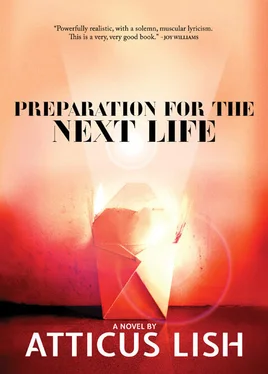The boss-woman wore a baseball cap and was shorter than she was and talked with her mouth flexed in a tight O around her overlapping teeth. I learn business on the Mekong River. Between customers, Zou Lei picked up a rag and wiped the food service steel, the woman pretending not to see her. She wore a gold pendant, talking on her cell phone with the hands-free earpiece in. Eleven hours later, when the propane tank had been turned off and the flame was out, Zou Lei asked her, am I coming back tomorrow?
You can, the woman said.
When deliveries came in, she said look, to Zou Lei, I show you, and pointed with her ladle where the man had left the Goodyear Farms boxes at the top of the stairs. Zou Lei carried them down two at a time and stacked them behind the counter. When they slipped, she caught the boxes with her knee, grinned and regrabbed them.
She went back to the stairs and reappeared hurrying this way between the pillars, taking fast steps, leaning against the weight of a bucket, one arm out to the side, the other arm pulled straight down, the wire handle cutting into her fingers. Halfway, she set it on the rubber mat with holes between the fused strands so water could drain through to the linoleum and flexed her hand. Something thumped the plastic. Then she went around the bucket and picked it up with her other hand and carried it the rest of the way. The boss-wife popped the lid and poked the frogs with her ladle.
Look, still living.
On her break, Zou Lei would go upstairs and look at the merchandise in the bins, while the vendors talked in their own dialect, pieces of what they said coming through to her and making a half kind of sense. She saw a denim-jacketed figure with a ponytail on a TV screen and it was her. They sold battery operated radios, the pink and blue words on the plastic package meaning Happy Sound. This is practical, the vendors said. And cheap. And you can learn English from it. Or she went out in the alley to be in the fresh air to do lunges under the fire escapes, but Fookienese teenagers with rat tails watched her, tried to get her attention, and after failing at this, began laughing at her. She get her ass big to fuck more tight.
Later, she tried another door and wound up in the shell of the building between the basement and the street, where she could be alone.
Mekong, that’s in the south, the boss-wife told her. On the Chinese side, I live. I live in South America, Ecuador. I see everything. They have a war there. I make money in the war, better in the war, better than here. Because people want to buy DVD, they want to drive away their life.
With her calloused hands, Zou Lei put frogs in a pot and turned the propane on. She kicked the cardboard boxes flat and stacked them in the trash. I’ll include you one meal a day, the boss-wife said. When Zou Lei got paid, she did her laundry and came to work the next day eating a twisted piece of bread fried in oil and drinking hot milk. Business is a joke, the woman said. They played Cantonese radio. Zou Lei took condiment packets home at night.
On her break, she did a handstand against the wall and tried to do a vertical pushup, even just an inch. First she took her phone out, which she had felt slipping out of her back pocket, and laid it on the stairs. Then she went back to the wall and kicked up into a handstand, holding herself on her hands. Her hat fell off her head and her shirt fell down to her armpits, exposing her flat stretched abdomen. She rolled down to her feet to a squatting position, dusted her hands off, and tried again.
She went for a jog around the block, but there was no block. The neighborhood around her house was full of levels. Walls and fences. You went down the street and it closed behind you, it screened you off, the courtyards and the back alleys, straw in the frozen mud. The bricks were faded on the buildings, turning to pumice, grayed-out. The boards and barricades in the alleys were gray-weathered, the piles of leafless brush were gray, husk-dry, piled under the windows, woven into the rusted wire fences. You could look up from a back alley to an old wall, a tree on the wall, another tier starting, a building, one of the new condos, the foundations at eye level. You could climb it. The houses and walls were stairs. It was a terraced hillside, a maze on a slant.
Dirty white houses were tucked in under other buildings, red blessings on the doors, Chinese New Year’s just behind us. On the dashboards of their Caravans and Quests, there were Buddhas. You could always see their laundry hanging out to dry. They made projects. Plants of ascending sizes, little designs, a money cat, plastic bags woven together to make ropes, the ropes tied from beam to beam, a contraption, you never knew what for.
You might smell joss in the tumbledown alley. You might see a stolen Corolla. You might see it going up and down if a girl was in it. In the back, where the rust was dripping down and the grills were weeping black on the bricks, everything was tended, an arrangement of boards and plaster buckets, a small pyramid design. If you heard voices coming from a window they were saying… what were they saying in Zhejiang dialect?
The workmen coming home — they might be exhausted or look sly with a smoke, smoking out of the side of the mouth, paint on their hands. They talked on cell phones, waited in pickups. Orange extension cords coiled in the back, a crew of five or six, drinking coffee, vapor coming up from the manifold, idling — bachelors, cousins, one last name.
In the evening, they came back to the apartment and ate their takeout and she heard their battery radios tuned to Voice of Mainland, speaking the common language. Singing ballads. The moon is round, the moon is round.
Along with the Chinese, there were Guatemalans and Hondurans and other Central Americans, having left behind what they called the problems in their countries. They were here and everywhere, here to work, across the expressway, beyond the globe from the world’s fair in Flushing Meadow Park and the stadiums over the river. Especially in Corona, except for the hole in the donut, the patch controlled by Italians. In the summer, in the park, she knew she would see the homeless Salvadorans burned black, see them playing soccer with a beer can, their shopping cart staked out under a tree like a horse grazing, the flags of their shirts hanging from it. The Chinese in jeans and jean jackets she saw here and now, coming home covered in plaster dust, or the odd one stoned, down here in the labyrinth of back streets.
There were people from India, the help desk people, the IT people. They had a string of businesses on the main artery: video, hairstyle, Punjab grocery. Neon signs, second-story porches and satellite dishes. Pakistanis living above their stores on the other side of Cherry, next to the tattered awning of Little Kabul.
You could take a wrong turn on Franklin, by the next lane over, by that courtyard with the cats in it, the trees with cancer, the ones that looked boiled, melted, cooled-off and hardened like that. The kind of high gates you see at a tow truck lot. The trash in the shed, the back of the building, an American flag with holes in it. Each unit had a steel door painted the color of Crest toothpaste. It said Nutty in spraypaint. On the chest-high foundations, Wreck, Remy, Slugz ‘92. The graffiti was faded. Asians lived in the low rises, but it said Murder in fresh paint and where did the alley go? You could climb into the windows, which were low on the first floor and unguarded, but you wouldn’t want to.
The streets had what some people called culture, one that preexisted the Asians. Franklin don’t quit, they said. It kept going, all the way from Hillcrest to Woodside to Sutphin. They were Spanish, black and Irish with their heads shaved and they compared their level to yours. You could follow it to the Rockaways, to South Suicide Queens. They meant street genius, notorious block parties, the deep five boroughs.
Читать дальше












